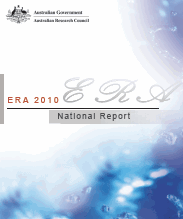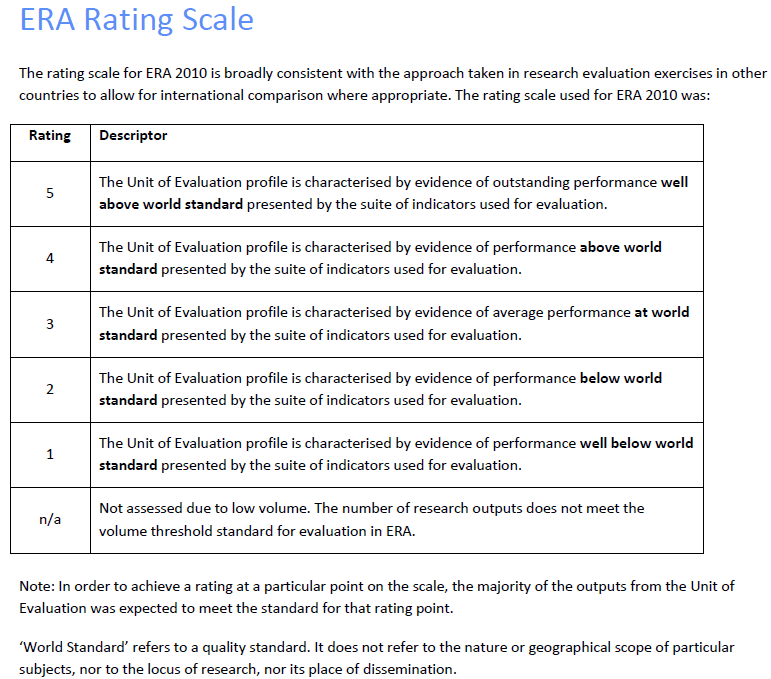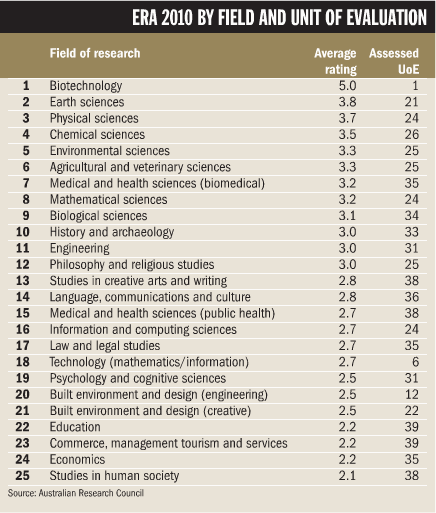|
|
|
|
|
|
|
News & Views item - January 2011 |
![]() ERA 2010 National Report Published. (January 31, 2011)
ERA 2010 National Report Published. (January 31, 2011)
As promised by the Department of Innovation, Industry, Science and Research the
300 page National Report for Excellence in Research for Australia (ERA) was
released by the end of January 2011 --
ERA 2010 National Report![]() .
.
So far what has elicited the public comment is how Australian Universities rank
in comparison to world standard. Just what that means is enunciated on page 5 of
the report and it is in fact a set of guidelines for the members of the National Report's "Research
Evaluation Committees". How it might compare with say the top half of the OECD
nations is a matter of conjecture as is the question of relevance as to how
public research funding should be apportioned.
in fact a set of guidelines for the members of the National Report's "Research
Evaluation Committees". How it might compare with say the top half of the OECD
nations is a matter of conjecture as is the question of relevance as to how
public research funding should be apportioned.
In any case the Group of Eight was first off the blocks with "Group of Eight research world class" and speaking as the chair of the Group of Eight, University of Queensland Vice-Chancellor Paul Greenfield stated:
ERA has assessed 94 per cent of research undertaken at Go8 universities as world standard or above.
While all Go8 universities achieved the highest ranking for Medical and Health Sciences, there is room for improvement in important enabling disciplines such as Mathematics and Economics... we can use the ERA data to improve performance in areas of national significance.
While overall these results are promising they need to be viewed in the context of rising investment in research capacity in emerging economies in Asia. The results are certainly no cause for complacency.
The Go8 welcomes the Government's focus on internationally benchmarked quality of research and looks forward to working with the Australian Research Council to improve the reliability of the data over time.
Later speaking as the Vice-Chancellor of The University of Queensland Professor Greenfield commented:
Credit for UQ's result goes to our researchers, who have demonstrated they can match the excellence of the world's best. ERA shows that outstanding quality is a hallmark of researchers in all of UQ's major fields. The outcome also reflects the impact of strategic investments in UQ discovery by the Queensland and Australian governments, philanthropists, business and the University itself.
_____________________________________________

_________________________________________________

Credit for tabulation: Times Higher Education 10-16 Feb 2011
_________________________________________________
In it write up of the National Report The Australian notes that the overall rankings of the nation's universities give the first eight places to the Group of Eight with scores out of 5 ranging from 4.38 (ANU) to 3.45 (Monash).
Now just for comparison's sake how do the ERA's rankings of the Group of Eight compare with those of Shanghai Jiao Tong University's world rankings of research universities.
| ERA National Report Ranking | ERA Average Score (from 5) | Shanghai Jiao Tong University World Ranking |
| 1. Australian National University | 4.38 | 59 |
| 2. University of Melbourne | 4.33 | 62 |
| 3 University of Queensland | 4.17 | 101-150 |
| 4. University of NSW | 4.04 | 151-200 |
| 5. University of Sydney | 3.83 | 92 |
| 6. University of Western Australia | 3.64 | 101-150 |
| 7. University of Adelaide | 3.55 | 201-300 |
| 8. Monash University | 3.45 | 151-200 |
So far the department of Innovation, Industry, Science and Research admits to funding spent or committed for the ERA assessment of $35.8 million, admittedly a pittance in comparison to Queensland and Victorian flood damage, but nevertheless to most individuals a significant amount. Is it worth it?
Margaret Sheil, chief executive of the Australian Research Council the entity charged with rendering the National Report 2010 had this to say to The Australian when asked whether universities might be inclined to ditch underperforming research areas; she doubted that would happen. My experience is that vice-chancellors tend to build areas that they think are important, rather than abandoning them. No vice-chancellor is going to abandon their business or law school because of ERA, because they are so critical to the national effort and to universities' activities.
Summing up the reasons for low scores: [They] tend to be in areas of high teaching volumes and in some institutions that haven't had the capacity to focus (their research efforts). Some universities started focusing on research strengths earlier than others and you can see that in the outcomes.
And she went on to add that scientists tend to "self select" into well-funded areas. At the same time, you don't need the same level of concentration where the single scholar is the norm. Even though you may have a great philosophy department, you don't require the same sort of investment as to build up a chemistry or medical research laboratory.
And then perhaps the most unintentional telling comment from the the ARC chief executive: A non-score doesn't mean its bad, just that it means that there wasn't the scale to make the exercise meaningful.
As an aside, the report is essentially a monumental statistical compilation -- so how does statistics rate overall on the National ERA scale?
0104 - Statistics - 2.9 - i.e. "below average on world standard"